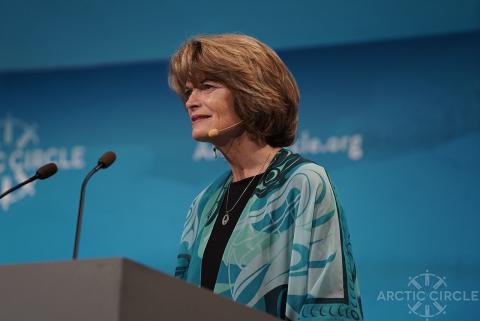Image Credit: Arctic Circle, pulled from Wikimedia Commons
US Sen. Lisa Murkowski says nonpartisan primaries and ranked choice voting are a good thing for Alaska elections and should be considered in other states.
Murkowski, who won re-election under both reforms, was recently interviewed for PBS's Firing Line. She spoke at length about how Alaska's new nonpartisan election system (Final Four Voting) works and the benefits it offers to voters and the political process at-large.
"I think what we demonstrated in Alaska was the possibility that electoral reform can happen and it can deliver outcomes that are less partisan and perhaps less politically rancorous," Murkowski said.
Alaska switched to Final Four Voting with the adoption of Ballot Measure 2 in 2020. Under the new system, all voters and candidates, regardless of party, participate on a single primary ballot.
Then, the top four vote-getters in the primary (again, regardless of party affiliation) advance to the general election where voters have the option to rank the candidates in order of preference (1st choice, 2nd choice, 3rd choice, etc.).
"Alaskans weighed in and they said, 'we want more participation in our elections; we want greater voice in how our representatives are selected,'" Murkowski said.
Murkowski is the first US Senate candidate to win an election under Final Four Voting. She came in first in the primary with 45% of the vote, and then won the general election with nearly 54% of the vote after three rounds of runoff under RCV.
She said she supports RCV, but also noted that her victory in 2022 didn't depend on it. She narrowly defeated fellow Republican Kelly Tshibaka in first choice selections with 43.37% of the vote to Tshibaka's 42.60%.
Murkowski addressed the common argument against RCV that it is too complicated or difficult for voters to understand. When asked if she thought it was, she emphatically said, "no!"
"Think about it," she said. "You go to a restaurant. You got a whole slate of things in front of you. 'Do I want the chicken fajita? Do I want the beef tacos? Do I want the enchiladas?' You select. We can prioritize. It's not hard."
ALSO READ: Alaskans Have Spoken: New Voting System Is Fairer, Easy, and Gives Them Better Candidates
Her re-election chances may have looked substantially different if primary reform didn't happen. She believes that had she run in a closed primary, there is a good chance she would have lost her seat.
"Had the primary been closed as we have seen int he past dozen years, I think it is a fair statement that I would have had a very difficult time in moving past the primary," she explained.
It would not have been the first time she lost a closed primary. She was defeated in the 2010 GOP closed primary by former US magistrate judge Joe Miller, who was endorsed by then Governor Sarah Palin.
Murkowski won re-election as an independent write-in candidate. She is one of only two people in US history to win a write-in campaign for US Senate.
The senator drew the ire of party leaders ahead of her latest re-election campaign for her criticisms and opposition to former President Donald Trump. She was rebuked by GOP heads when she voted against Trump after his second impeachment.
The influence Trump and other GOP leaders would have had in a closed primary would have been exponentially greater. In the past, they could have used this influence to punish Murkowski the way they have candidates in other states who don't put party interests first.
Many voters may have heard the term "primaried." Put simply, party leaders weaponize partisan primary elections to keep elected officials in line -- giving them a level of control over the political process that concerns Murkowski.
"We need to look at this," she remarked. "Is this really where the American electorate is? Giving all the strength to party leadership?"
Murkowski added that closed partisan primaries play a role in the extreme partisanship voters see in Washington DC today.
"We see individuals that their heart, their mind knows where they should be on a particular vote, but they know they are going to get creamed by their party if they vote 'the wrong way.'"
Over 60% of Alaskans choose not to affiliate with a party. Under the old system, their right to vote was conditioned on joining a private political organization. Now the process is open to them to freely participate and have choices they didn't have prior to reform.
Murkowski believes Alaska's electoral model has become an example for other states, because when states pass voting reform, the interests of voters become the top priority.
"Voters in states where the voter is really encouraged to look at the individual, they want that individual to stand up for them, to stand up for what is right instead of to stand up for the party position," she said.
Watch Murkowski's full interview here.
